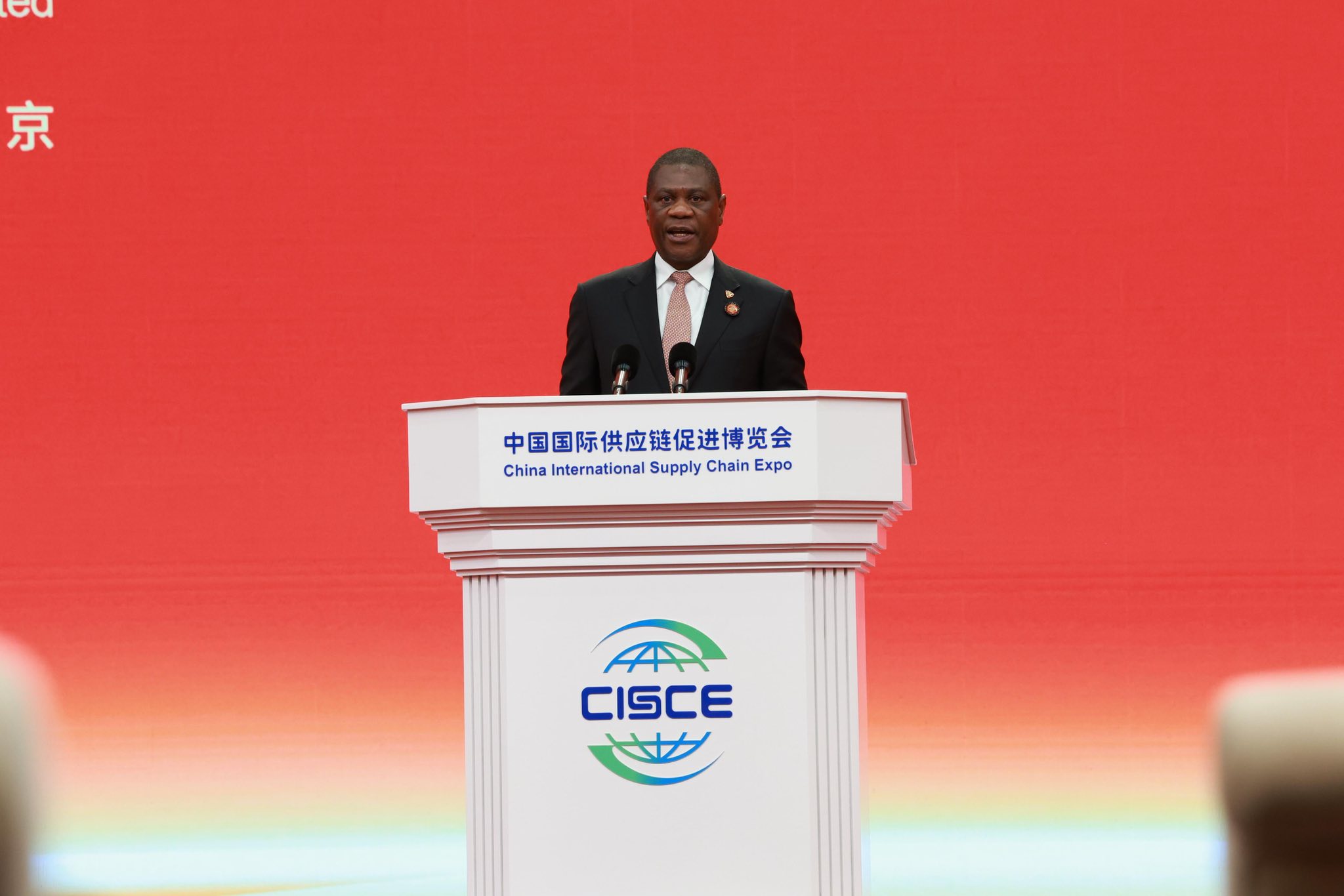Mashatile: E-Commerce, Green Energy, China Ties Fuel SA’s Supply Chain Growth
“Our business communities have been resilient, adapting through strategies like diversifying suppliers, holding more inventory, and investing in digital transformation,” Mashatile said.

- Country:
- South Africa
Despite numerous global and domestic challenges, South Africa’s supply chain sector is experiencing renewed growth, driven by a surge in e-commerce, technological innovation, and strengthened international partnerships. This message was strongly delivered by Deputy President Paul Mashatile during the opening ceremony of the China International Supply Chain Expo (CISCE) in Beijing on Wednesday.
Mashatile is in China on a strategic working visit aimed at deepening economic and trade ties between the two nations. His participation in CISCE comes at the invitation of Ren Hongbin, chairperson of the China Council for the Promotion of International Trade (CCPIT), and signals South Africa’s growing role in the reshaping of global supply chains.
“Our business communities have been resilient, adapting through strategies like diversifying suppliers, holding more inventory, and investing in digital transformation,” Mashatile said.
South Africa’s Supply Chain Adapts Amid Global Disruptions
Mashatile acknowledged that the global supply chain ecosystem has been increasingly impacted by natural disasters, geopolitical tensions, and economic shocks, but emphasized South Africa’s commitment to ensuring resilience.
“South Africa is committed to strengthening global supply chains and fostering resilience in the face of challenges,” he said. “We understand the importance of building robust supply chains that can withstand disruptions and ensure the efficient flow of goods and services.”
He pointed to government support for digital transformation, infrastructure investment, and export diversification as central pillars to stabilising and expanding South Africa’s trade position.
South Africa’s strategic geographic location—serving as a gateway to Africa and a hub for Southern Hemisphere trade—was highlighted as a comparative advantage in the global supply network.
E-Commerce Growth and the China Connection
The Deputy President spotlighted the exponential rise of e-commerce as a transformative force in logistics and supply chain management, urging further collaboration with China on digital platforms.
“One of the most critical steps in South Africa’s journey to balancing its trade with China will be the extensive listing of South African products on e-commerce platforms like Alibaba,” he said.
He added that steps are being taken to secure shelf space for South African products in China’s Free Trade Zones, where increased visibility would allow South African businesses to penetrate Asian consumer markets.
Mashatile described China as an indispensable economic partner, highlighting more than a decade of China being South Africa’s largest bilateral trade partner. However, he acknowledged the trade imbalance, where South Africa's exports are heavily dominated by mineral commodities.
“While the trade volumes confirm South Africa’s natural endowment, the heavy slant towards mineral-based exports belies our advanced infrastructure, our diversified industrial base, and our leading service sectors.”
Showcasing ‘Made in SA’: From Tech to Textiles
A 30-member South African business delegation joined the government at the Expo, comprising manufacturers and producers across several sectors. These included:
-
Ethically sourced, clean cosmetics made from natural African extracts
-
Durable electro-technical equipment designed to withstand extreme weather
-
High-end fashion, leather goods, and footwear
-
Engineering, plastics, and chemicals companies with a track record of collaboration with Chinese firms on infrastructure projects
“We are exceptionally proud of the delegation that comprises mining engineering firms whose services have met Chinese standards and contributed to joint infrastructure ventures,” said Mashatile.
The Expo provided a valuable matchmaking opportunity for Chinese buyers and South African suppliers, and further opened the door for industrial partnerships.
Driving Renewable Energy Through Industrial Policy
Beyond trade, the Deputy President emphasised the centrality of green energy in South Africa’s economic transformation agenda. He revealed that South Africa is fast-tracking investments in solar and wind energy infrastructure as part of its broader energy diversification efforts.
Through the Renewable Energy Masterplan, the government aims to:
-
Establish a domestic manufacturing base for green technologies and battery storage
-
Attract at least R15 billion in green investment by 2030
-
Train a new generation of skilled “green workers” for up to 25,000 direct jobs
“We have set ambitious targets for renewable energy deployment, particularly in solar and wind power,” Mashatile stated.
He invited Chinese investors and manufacturers to collaborate in renewable energy and battery value chains, noting the potential for new green industries on the African continent.
AfCFTA and Pan-African Economic Integration
Mashatile also positioned the African Continental Free Trade Area (AfCFTA) as a game-changer in regional economic integration. He encouraged China and other global partners to leverage AfCFTA frameworks to expand trade, logistics, and manufacturing partnerships across Africa.
“The AfCFTA fosters economic integration and increased trade and investment within Africa, while also providing opportunities for China to deepen its engagement with the continent,” he said.
With its advanced ports, road networks, and rail corridors, South Africa is poised to become a central logistics node for intra-African and intercontinental trade under the AfCFTA regime.
Laying the Groundwork for a Resilient, Green Trade Future
Deputy President Mashatile’s participation in CISCE showcased South Africa’s resilience, vision, and ambition to lead in the evolving global trade ecosystem. From e-commerce expansion and digital transformation to green industrialisation and deeper partnerships with China, South Africa is actively shaping its future supply chain strategy.
The nation’s efforts to rebalance trade with China, diversify exports, and localise green manufacturing represent a clear signal that Pretoria intends not only to survive global disruptions—but to thrive in spite of them.










